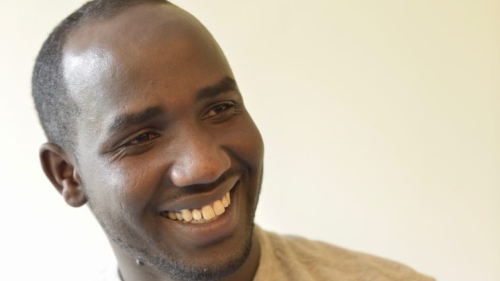
Dogon Nshimiyimana
On Tuesday, May 20th, Dogon Nshimiyimana, a master’s candidate in international education, stood on the stage of the Hulu Theatre in Madison Square Garden and collected his diploma with 1,505 NYU Steinhardt graduate students.
It had been a long journey for Dogon, who spent his early years in the eastern Democratic Republic of the Congo (DRC) in the Masisi Territory of the Northern Kivu Province.
If Dogon’s trajectory had not been interrupted by an ethnic cleaning campaign that targeted his tribe, the Bagogwe of the Congolese Tutsis, he might have lead a peaceful life “looking after cows” on a bucolic stretch of land in his home village of Gasheberi.
But in 1996, Dogon and his family fled to a refugee camp in Rwanda to escape the escalating violence in the DRC, a country that he notes is “one of the most dangerous places in the world for a human being.”
Though much in his life has changed since he fled his home with his family, Dogon’s love of the written word has remained a constant.
He can trace his wish to learn back to his early life with his father.
“When I saw my father reading the Bible, it was, for me, a miracle. How can someone discover a letter and know this is an A or a B? I wanted to read like my father, and that motivated me to read and write. I was also very curious and eager to learn to read the Bible because I am Christian,” he says.
The Gihembe Refugee Camp, where Dogon lived, has hosted 12,407 refugees since its creation in 1997. The UN Refugee Agency (UNHCR) reports that of the 19.9 million refugees under their care, 7.4 million are of school age. Their access to education is limited, with 4 million unable to attend school.
The camp is a place without running water and electricity, where refugees like Dogon live on a $7 a month food allowance from the UNHCR. Dogon used that allowance to buy corn and beans, eating “one meal in every two or three days from January to December for 23 years.”
Dogon began his education in a makeshift classroom under the trees at the age of six. His teachers were refugee volunteers, many with only a sixth grade education.
“We sat there every day until nightfall,” Dogon says. “And we did not have books, paper, or pens. I wrote on a slate given to me by Unicef until I reached the 4th grade.”
When Dogon aged out of the refugee camp classroom, a sponsorship from a single woman who worked in a bank in Kigali paid for one year of high school; a soccer scholarship provided the funding for him to graduate.
Though he was admitted to the prestigious University of Rwanda with the highest national examination grades in his county, his refugee status made him ineligible for tuition assistance. Dogon managed to graduate from the University of Rwanda in 2016 with a concentration in literature and education. A sponsor from the United States found him after reading his story.
A generous donor helped Dogon apply to NYU Steinhardt and make the transition from life in the refugee camp to NYU’s Washington Square campus.
At NYU Steinhardt, Dogon slowly adjusted to a life that included the novelties of borrowing books from the library, eating three meals a day, and making independent decisions.
Initially, Dogon was wary of using library resources.
“I didn’t want to take a risk losing a book,” he said. “A book could get lost in the refugee camp and I would have no money to replace it.”
Dogon says that he had “seen the people who live in refugee camps suffering,” and believes that education is the most powerful tool we have to change a life.
“When I went to school, I saw how other people who went to school came back and changed their communities. I thought, ‘Wow! I want to do that,” Dogon says.
He intends to use his master’s degree in international education to help refugees find pathways to education.
He is the founder of Healer of Broken Souls, a program that helps women in the Gihembe, Kiziba, and Nyabiheke refugee camps. Since its inception, three women have been university-educated and 35 women have been supported with special services.
Dogon owes a debt of gratitude to all the people who helped him on his academic journey.
“I was able to come to the United States to study because people believed in me. It is now my turn to pay it forward for other refugees.”
